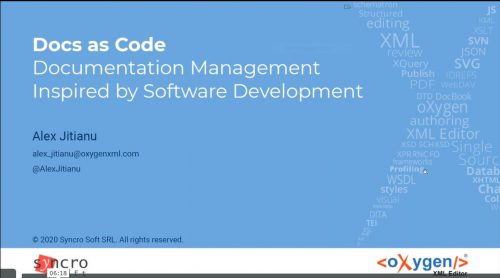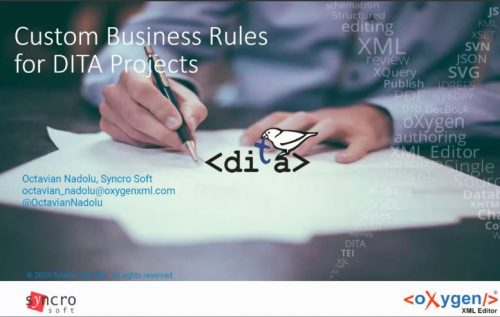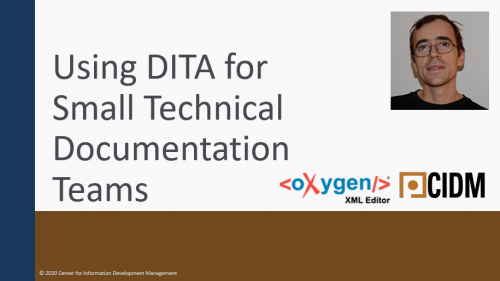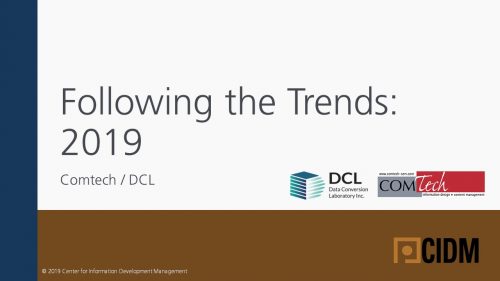- Storage and issue management using GitHub
- Automated quality checks and continuous publishing using Netlify
- Editing and collaboration support
- Release strategies
-
September 16, 2020 Tools and techniques used in software development can also be applied for documentation management:
-
December 16, 2020 A step by step guide to getting started with Schematron and Schematron Quick Fixes. Schematron and Schematron QuickFix (SQF) languages can be used to improve efficiency and quality when editing DITA documents. You can define actions that will add complex structure in your documents, or make modifications in multiple places or actions that will convert a structure into another. These changes are made by keeping the document structure valid and conforming to your project specification and will help the content writer add content more easily and without making mistakes. Join us to see:
- How to create business rules with Schematron
- How Schematron rules are applied
- How to apply specific Schematron rules on all DITA files
- How to develop Schematron Quick Fixes to make it very easy to solve the reported problems
-
April 1, 2020 Implementing DITA with a small team of technical writers does not have to be expensive or difficult to set up. We'll go through the steps of implementing a DITA solution using GitHub for storage and workflow and Oxygen XML Editor for editing. We'll also look into how you can automate publishing and receive feedback from your end users. As a practical example we'll look into how editing, collaboration and publishing on the Oxygen XML Blog works. Presented by: Radu Coravu started working more than 10 years ago as a software developer for Syncro Soft SRL, the manufacturer of the popular oXygen XML Editor. During the last years, his main focus has been in the development of the visual XML Author editing environment and the specific-DITA support provided by oXygen. He provides support for complex integrations and helps steer the product in the right direction, all this with some development on the side.
-
April 30, 2019 Consumers have more avenues than ever before to find the content they need. Are you trying to decipher how content trends are impacting your business? Do you need to respond to a rapidly changing digital marketplace? Join us to discover how changing content development and delivery requirements are affecting your business today. Learn how others in the information-development community are planning to respond to new customer demands for innovative approaches to development and delivery. In its seventh year of collecting data, the Center for Information-Development Management (CIDM) and Data Conversion Laboratory (DCL) asked managers, information architects, writers, training developers, and more how they are addressing the challenges of meeting customer information needs. During the webinar we walk through the results of the 2019 Trends Survey, a study we have been conducting since 2012. We trace the changes in how we think about developing and delivering content. Presented by: Dawn Stevens, President, Comtech Services and Director of CIDM has 28 years of practical experience in virtually every role within a documentation and training department, including project management, instructional design, writing, editing, and multimedia programming. Dawn is the perfect advisor to identify and remove the challenges you face in producing usable, technical information and training content. With both engineering and technical communication degrees, Dawn combines her solid technical foundation with strong writing and design skills to lead our team of consultants and specialists in providing the expertise you need. Mark Gross, President, Data Conversion Laboratory, is a recognized authority on XML implementation and document conversion. Mark also serves as Project Executive, with overall responsibility for resource management and planning. Prior to joining DCL in 1981, Mark was with the consulting practice of Arthur Young & Co. Mark has a BS in Engineering from Columbia University and an MBA from New York University. He has also taught at the New York University Graduate School of Business, the New School, and Pace University. He is a frequent speaker on the topic of automated conversions to XML and SGML.




